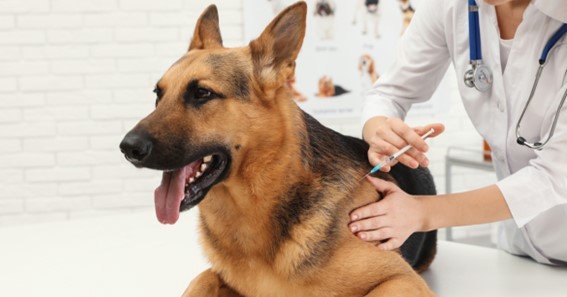How often do dogs need rabies shots? In most states, your puppy’s first shot should be given when it is 14 to 16 weeks old. One year after the first shot, the puppy should get a booster shot. Rabies is caused by a virus that can infect both people and animals.
How Often Do Dogs Need Rabies Shots?
Dogs get their first shot between 14 and 16 weeks old and then they will get a booster shot a year later. Each state has its rules about when dogs must be vaccinated against rabies.
Based on state rules and the type of vaccine used, your dog should get a rabies booster shot every one to three years after that. Your vet is the best person to tell you how often your puppy should get extra shots.
Dogs generally need rabies boosters every one to three years, depending on local regulations and vaccine type, highlighting the critical role of vaccination in protecting both pets and public health.
Importance Of Rabies Vaccination For Dogs
Knowing the basics and importance of rabies shots can help you make intelligent choices about your dog’s health and keep them safe from this deadly virus. Not only are rabies shots important for your dog’s health, they are also crucial for public safety. Because rabies is a zoonotic disease, it can be passed from animals to people.
Vaccinating your dog helps stop the spread of this dangerous virus and keeps your pet and your family safe. Your dog’s immune system will make antibodies to fight the rabies virus if they ever get it because of the vaccine.
Legal Needs For Rabies
Most states have rules that require dogs to get rabies shots. Because of these rules, rabies outbreaks are less likely to happen. Not following these rules can lead to fines, putting your pet in a quarantine area, or even death in the worst cases.
It’s essential to know the rules in your area and ensure your dog has all its shots. Following these rules helps stop the spread of rabies and keeps your pet safe from possible health and legal problems.
Schedule Vaccinations For Dogs
As we already said, dogs should get their first rabies shot between 14 and 16 weeks old, and then they should get a booster shot a year later.
Then, booster shots are given every one to three years, depending on state laws and the type of vaccine used. Your vet can tell you the exact plan for where you live. Following this plan is crucial to keep your dog’s rabies immunity current.
Vaccine Efficacy
Rabies vaccines work very well, but none of them protect against everything. But there is a minimal chance that a protected dog will get rabies. Even if a protected dog is exposed to the rabies virus, they are unlikely to get sick because the vaccine works well. Getting your dog vaccinated regularly is the best way to keep him safe.
Boosters Matter For Dogs
The immune response that the first rabies shot caused weakens over time. To re-stimulate the immune system and keep protecting against the virus, booster shots are necessary. For long-term immunity, it’s essential to stick to the booster plan.
Each extra shot helps the immune system remember what it did before so it can recognize and fight the rabies virus if it comes up. This ongoing defense is essential for your dog’s health and safety.
Veterinarian Consultation
For advice on rabies shots, your vet is the best person to ask. They can tell you about the right time to get vaccinated, how much it costs, any possible side effects, and any laws that apply to your area.
Regularly taking your dog to the vet will help keep it healthy and in line with local rules. Your vet can also answer any questions you have about the shots and address any worries you have about your dog’s health and well-being.
Conclusion
The rabies virus is hazardous to both people and animals because it can kill them. A vital thing you can do to stop the spread of this disease is to vaccinate your dog.
Following the suggested vaccination plan, knowing the possible side effects, and knowing the rules in your area will help keep your pet safe and healthy. Always contact your veterinarian to keep your dog’s vaccinations up to date and protect them from this fatal disease.
FAQ
How Much Does It Cost To Give A Dog Rabies?
The cost of a rabies shot for a dog varies based on factors such as location, veterinary expertise, and tools used. It’s best to consult your veterinarian to get an accurate estimate for your situation.
What Should I Do If The Rabies Vaccine Doesn’t Work For My Dog?
After getting a rabies shot, if your dog has severe signs like vomiting, diarrhea, hives, swelling around the face, or trouble breathing, you should immediately take them to the emergency vet. Mild reactions, like pain where the needle was inserted or a mild fever, generally disappear in a few days.
Can A Dog That Has Been Vaccinated Still Get Rabies?
Even though rabies shots are very good at protecting against the disease, no shot can promise 100% protection. There is a minimal chance that a vaccinated dog will get rabies, but it is essential to keep up with vaccines to lower this chance.
Why Do You Need To Get A Rabies Shot Again?
Rabies booster shots are needed because the first vaccine doesn’t make the immune system work as well after a while. Boosters help keep your dog’s immune system strong so it will stay safe from getting the virus.
Is Getting A Rabies Shot Needed By Law?
Yes, getting a rabies shot is needed by law in most states. These rules aim to protect public health and stop the spread of rabies. If you don’t follow the rules, you could be fined, put in confinement, or even have to put your unvaccinated pet down.










